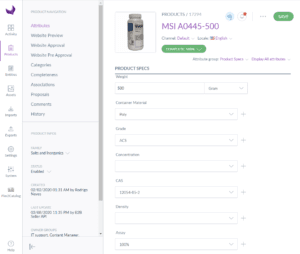Founded in 1975 as a distributor of equipment, chemicals and related products for Midwest industrial and commercial science laboratories, Midland Scientific Inc. has grown steadily over the years and now sells more than 500,000 products through its ecommerce site and via a salesforce that covers the entire country.
The company, based in the Omaha, Nebraska, suburb of LaVista, has realized steady growth in a competitive industry by offering competitively priced products available in a large number of options backed by the personal attention of sales and customer service teams, Midland says.

Rodrigo Neves, technology officer, Midland Scientific Inc.
But as more customers are choosing the ecommerce channel to make purchases, Midland is upping its online game and preparing for a whole new level of growth by migrating its ecommerce site to a more flexible and responsive platform backed by improved product management, search capabilities and customer service.
The privately held company doesn’t release sales figures, but says that ecommerce accounts for about a quarter of total sales—a ratio it’s determined to grow, says Rodrigo Neves, who oversees ecommerce and product management systems as Midland’s technology officer.
A journey into the digital age
How Midland arrived at this growth juncture is a story about an established B2B company coming to grips with the digital age.
Midland has been selling online for years, but its ecommerce journey up to now hasn’t always been smooth. For example, in the past managing the data on its expansive product lines of some 400,000 SKUs across 400 categories—often with a dozen or more attributes customers can choose among for each product—could be difficult, time-consuming and confusing, Neves says.
If Midland’s product inventory isn’t well-organized, updated and described with consistent accuracy, it can be difficult for customers to find the specific items they need and for Midland’s product managers to put on timely product displays.
“Our website had a lot of limitations,” he says. “It was a huge challenge to manage all of the content for it.”
In addition, Midland realized it needed to make its website easier for customers to set up and manage their accounts, place and authorize orders, request quotes for special orders, and manage payment and shipping options—all of which can differ for individual buyers and departments within each customer’s corporate structure.
The need to quickly customize
Midland also needed a more flexible and robust technology platform that it could more easily and quickly customize, Neves says. And it needed uninterrupted data integration between the ecommerce site and its enterprise resource planning system to better manage accurate and up-to-date information on products and customer activity.
After researching the ecommerce technology market, Midland chose Adobe Inc.’s Magento Commerce 2 platform for its built-in B2B features, technical assistance and access to a large number of plug-in applications from Magento’s developer community, Neves says.
Midland retained DCKAP, a Freemont, California-based web design and development agency that works with several ecommerce technology platforms and specializes in helping brands, manufacturers and distributors sell online.
Midland’s Magento Commerce site integrates with its Epicor Prophet 21 enterprise resource planning system (ERP), Akeneo product information management application (PIM), and Tour de Force customer relationship management system. The Akeneo PIM system integrates product data, including descriptions, images and categories, between the ERP system and the ecommerce site. DCKAP’s Cloras data integration middleware software integrates all other data, including customer order activity and contract pricing for each customer.
The new platform’s improved data integration and site search have already helped in a big way how customers get value out of using Midland’s ecommerce site, MidlandSci.com, Neves says.
Thousands of beakers to choose from
A common product like a laboratory beaker for holding chemicals, for example, could have about 13 attributes, and each attribute could have multiple features. “So, there could be thousands of different beakers,” Neves says.
Customers purchasing such items for industrial and commercial uses, such as in the food industry, often have to meet strict standards for controlling the quality of foodstuffs. Depending on the type of laboratory testing they’re conducting, customers may need equipment of a certain size or made of particular materials to withstand required temperatures and pressures.
Under its old system of managing product data, Midland personnel would manually enter new product information from suppliers into Excel spreadsheets, then enter the data into the ERP system for transfer to the website. But that process was difficult to manage quickly and accurately—and the content team wouldn’t know exactly how a product would appear on the site until a couple of days later. “It could look different on the web,” Neves says. “The information might be too long; we’d often have to correct the spelling and redesign it to fit the product displays.”

A section of Midland’s Akeneo PIM system organizes product details.
Midland’s new Akeneo PIM system can gather product information in data feeds from multiple sources, including directly from suppliers and from Midland’s inventory management system. The PIM then synchronizes the product information to make it appear accurately and consistently on Midland’s website as well as in other marketing materials.
There are several benefits to this set-up, Neves says. Attributes are listed accurately and consistently—such as terms like “liter” to describe “volume,” instead of having multiple options like “l” or “L” to describe either volume or other similar terms like “capacity.” That provides customers with a more streamlined and easier-to-use search-and-navigation system.
Responding to demand for COVID-19 products
The PIM also makes it easier and faster for Midland’s content managers to set up new product categories, Neves adds.
For example, when Midland decided to set up a new category to begin selling masks and other personal protective equipment related to the COVID-19 pandemic this past spring, the PIM enabled its product management team to make the masks available for purchase online within a day, listing all of the attributes like size, color and type.
“Under the old way, we used Excel to create a new category in the ERP system, create data mapping, and synch the data between the ERP and the website,” Neves says. “That would take more than a week, and then we’d still have to make adjustments.”
Product managers are able to preview a new product display in the Akeneo application, ensuring that content is accurate and displayed correctly before going live on a web page, he adds.
To further upgrade its ecommerce site to better serve customers and make it easier for Midland to manage with timely product displays, Midland relaunched MidlandSci.com in August on the Magento Commerce 2 platform. It’s taking advantage of the open source and “headless” commerce technology for making the site more flexible and scalable, Neves says. With open source, Midland can access the core software code to customize its ecommerce technology, and the headless environment will provide more options for connecting its ecommerce engine with multiple customer-facing interfaces.
Among the B2B features Midland is offering on the new ecommerce site are systems that support:
- Dynamic pricing, providing the ability to display special pricing for contract customers as listed in the Prophet 21 ERP system, while also displaying other pricing for other site visitors;
- A quick-order feature, including shopping lists that customers can modify before adding a list to a shopping cart;
- A workflow process for customers to approve invoices through a “My Invoices” module;
- Request Quote, enabling customers to negotiate pricing on a list of products;
- Request to Buy, which enables a purchaser to request authorization from a superior to order a restricted item, such as certain chemicals with a hazardous rating that are restricted to qualified buyers; and
- A tax exemption application that lets qualified customers upload tax-exemption documents.
Gearing up for more online sales
In addition, the new platform enables Midland’s sales reps to access customer account data and to place online orders on behalf of customers.
DCKAP also worked with Elasticsearch site search technology, and the Elasticsearch Suite extensions for Magento 2, to implement a customized search-and-navigation system based on multiple criteria, including product name, category, attributes, part number and keywords.
With its relaunched ecommerce platform, Midland is putting itself on a course to generate more business online.
“We’re trying to get ready for the future,” Neves says. “We’re at about 25% of sales through ecommerce, and we want to increase that.”
(Neves will participate in the B2B Next 2020 conference, speaking on personalizing the ecommerce purchasing experience for B2B buyers.)
Sign up
Sign up for a complimentary subscription to Digital Commerce 360 B2B News, published 4x/week. It covers technology and business trends in the growing B2B ecommerce industry. Contact editor Paul Demery at [email protected] and follow him on Twitter @pdemery.
Follow us on LinkedIn and be the first to know when we publish new Digital Commerce 360 B2B News content.
Favorite